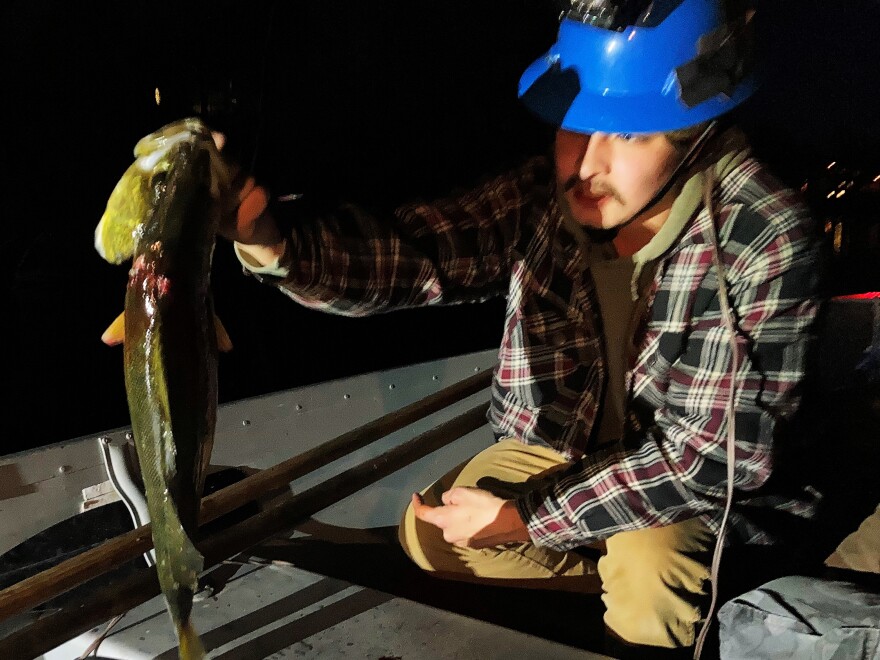The sun is sinking into the horizon when an eclectic mix of Lac du Flambeau tribal leaders, teenagers and kids gather at the community Bingo Hall to prepare for a night of spearing.
Some of the people present have speared fish for decades. For others, this will be their first time.
But regardless of age and experience, everyone can feel the excitement that pulses through the air like beats of the drum.
It’s one of the first warm days of the season — a welcome sign for the fish who have begun spawning, and the fishermen who are ready to begin spearing.

Spearing is an ancient practice among the Lac du Flambeau Ojibwe. It’s how the community got its French name, which translates to Lake of the Torches.
The practice of spearing has evolved over time, but it has not disappeared.
Tribal leaders want to make sure it never does. Tonight, they are teaching their children to make sure the tradition stays alive.
As the group migrates to the lake shore, an elder, Eric Chapman, gives each person a pinch of tobacco to sprinkle into the water.
“We’re offering appreciation, thanks to that water spirit and we’re also showing appreciation and thanks to those fish spirits that are in the water,” he says. “Those are the ones that are going to give themselves up for us tonight to nourish ourselves, to nourish our community.”
Then, as daylight gives way to starlight, they push metal boats into the water, motors whirring through the night.
Leo Peterson balances in the bow of one boat. He’s an apprentice himself, but tonight he’s teaching younger kids how to spear.
He wears a beaming light on his head, which he uses to rhythmically scan the dark water.
“The light reflects off the walleyes’ eyes,” he explains. “That’s how we’re able to see them at night.”
When ice melts from the lakes, walleye and other fish swarm to shore in multitudes to lay eggs in the shallow water.
Peterson carries a long metal spear to harvest those fish.
“These are our newer [spears],” he says. “They’re made out of metal, and they have four prongs so they stake them pretty well.”

But the metal, motors and electric lights are all relatively new inventions.
They’ve replaced technology that’s hundreds of years older.
“Waswagon means fire hunting,” says Wayne Valliere, a teacher and renowned craftsman, who has spent his lifetime studying Anishinaabe history and recreating cultural artifacts like birchbark canoes. “We are the Waswagoning Anishinaabe, the torch people.”
Valliere is spearing tonight by fire light.
“When it gets dark, as the torch spits, crackles and pops, it’s going to attract the fish to it,” he says. “We’re going to harvest fish by artificial light, torchlight, tonight, like our ancestors did 600 years ago in this area, in these very lakes we’re going as a matter of fact.”
Valliere won’t use a motorboat to catch fish, but instead a hand-crafted canoe and spear made entirely from natural materials — tools just like those of his Ojibwe ancestors.

He has recreated the past, so that it is remembered in the future.
“We feel close to our ancient past when we do these things,” he says. “We do these things for our children because of our identity, never to lose who we are.”
Back on his boat, Leo Peterson is helping a younger boy learn to spear.
“Right there, you can kind of see them,” he says, pointing to fish swimming in the water.
They aim, thrust the spear into the water and miss. It’s part of the learning process.
The boat continues to crawl along the shoreline and the moon climbs higher into the sky.
They miss again and again.
But then, they catch one and cheer.
It’s cause for celebration, and not just because they caught dinner.
This fish represents the passing of traditional, cultural knowledge from one generation to the next.







